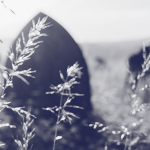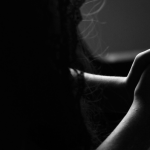Molly was the first girl I ever fancied. There was something loose in her eyes, something frantic and unsatisfied. Her father was a violent man. Her mother was wild and free- a risk lover. Molly spent most evenings at our house because hers was full of flying plates.
We played all the usual games. Doctors and nurses. Husbands and wives. We would pretend she was a lady in the woods and I was a blacksmith called John. I used to think all blacksmiths were called John.
Back then, nakedness only meant having no clothes on. Still, she was the first woman to hold me in her hands. It looks like a little mouse. She said once. Bald and quivering.
Molly was two years older than me, and she grew out of games quicker than I did. It ended on the swings by the garage. My first breakup – first heartbreak. To this day I can’t remember which of us did the breaking.
*
Marianna was different. At art school she glued to me on induction day. Her smile was brilliant and untethered, as if it might float off shinning and snag on a tree or passing plane. I liked her a lot.
She was full of something that I was keenly lacking. Every time I touched her my body would hum. My lungs and ribs would shake within me, as if there was a shoal or a hive or a flock of birds between my shoulders.
She used to read my dreams. Told me her mum worked in a magic factory, but never talked about her dad. She would draw skinny sloping figures in her sketchbooks. Her art was always about obscurity, reveries and riddles. The kind of girl who collected insect husks and snail shells. Pretty dead things. She would say.
One afternoon, close to the end of term, we snuck out of class and found a green. There was cider and cigarettes and long hours to kill. It was the start of summer. The end of whatever we’d been sharing.
Drunk, she told me she lost her virginity at thirteen. Drunker still, she told me it wasn’t by choice.
I’m sorry. I said. Held her awkwardly in the rain. Her body was thin and I felt it tremble in my arms while my chest hummed its ceaseless whirr. I didn’t know what else to say.
She was the most dazzling person I’d ever met. Here she was, putting all the words I would ever need in my mouth. Holding on to my hands for dear life, the way I would learn to hold a pen in years to come, remembering her gift of soaring above the wreckage.
I didn’t know what else to say.
Years later, I called her from India after scattering my father’s ashes. I’m sorry. She said. I can’t talk. I have a husband now, two sons and a part-time job. I’m sorry. She said again. I miss you. And put the phone down.
*
Loo came next. Sag-lipped and surly, she spent half the time insulting me and the other half biting my stomach. For weeks I had long loops of kisses blooming underneath my t-shirt. They were angry red and circular. The shape of our love.
When I showed them to my friends in life drawing, they sucked air through their teeth and turned away. I still don’t know if they were jealous or just disappointed.
Loo never spoke much about her feelings. Instead she had a list of songs on her iPod. Whenever things were rough, or serious, or just plain weird, she would scroll through and pick the one that matched her mood.
We spent too many nights lying together scrolling through her list, no knowing what either of us felt or wanted.
*
Charley was partially deaf, small and strong with bright blue hair. We spoke with our hands most of the time. When the lights were dim and she couldn’t read my lips I would write messages across my wrists and she would smile and nod.
Sometimes love is like a cut, it frees you from a knot you can’t unpick. When your life has become a series of monotonous habits and spheres, you need something sharp to trim away the frills.
Her mother was a hippy who owned a bookshop in New York in the 60’s. White dreadlocks falling across her cheeks, she told me about her meetings with prestigious writers. e.e. cummings picked his nose. She said. Bukowski was surprisingly polite. Ginsberg still owed her twenty bucks – never trust a poet. She said with a wink.
Charlie was embarrassed by her mother. Preferred to talk about her father who was in jail in America for killing his lover. She curled tight to me in the dark of her room and whispered that’s what real passion was.
She told me things I swore I’d never repeat. Poured her secrets into me as if I was a wishing well, slowly filling with pennies I’d never spend. She said his name, once or twice. And I hated him with my whole heart, for stealing my place on her lips.
The next morning I opened my notebook while she was still in bed. I looked at the words on the page, looked at the words and wrote nothing. Nothing at all.
…
Biography
Philip Webb Gregg is a writer of literary fiction. Most recently published in X-Ray Magazine, Bath Flash Festival Anthology, Storgy, The Molotov Cocktail and Reflex Fiction. His work orbits the weird and the dark, with an emphasis on the honestly surreal. He studied at Cambridge School of Art, and lives in London. @philipwebbgregg
Image: unsplash.com





